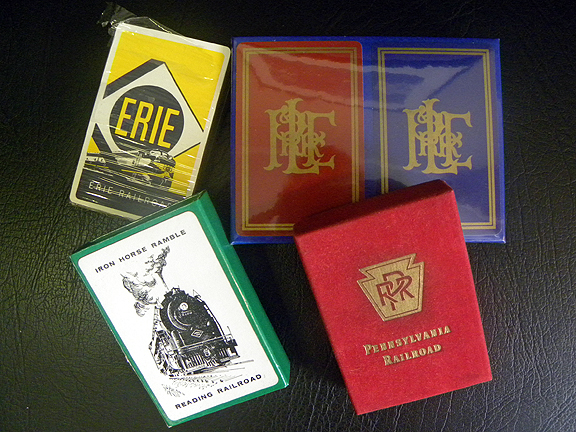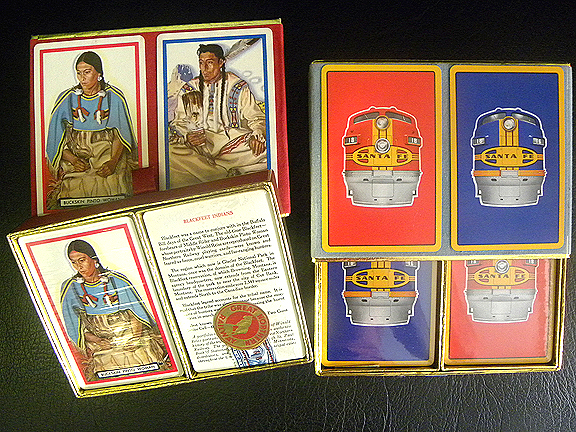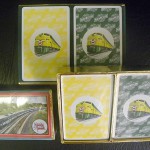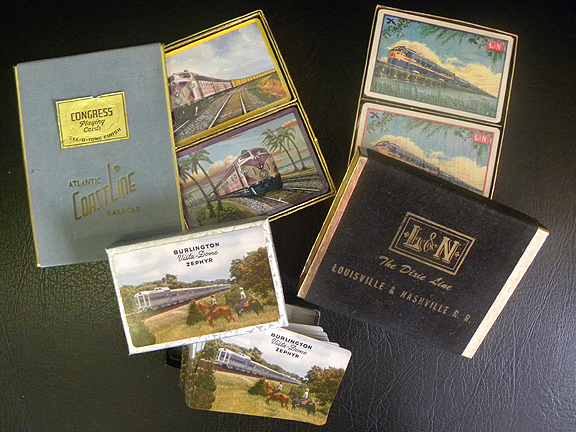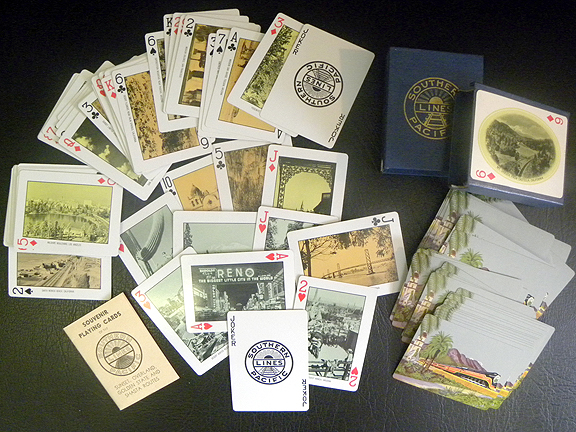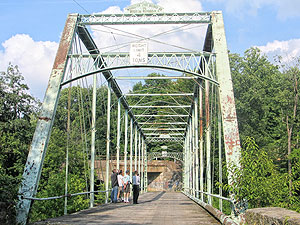
Archive: Aug 2010
-
Fairbanks Feature: Playing Cards from Well Known Rail Lines
James D. Van Trump Library | Frank B. Fairbanks Transportation Archive | Fairbanks Features
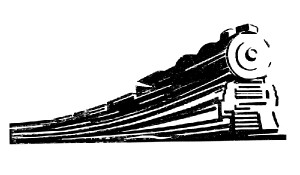 Showcasing a variety of materials located in the Frank B. Fairbanks Rail Transportation Archive
Showcasing a variety of materials located in the Frank B. Fairbanks Rail Transportation ArchiveNo. 7 Presentation
Fairbanks Feature: Playing Cards from Well Known Rail Lines
In the golden days of railroad travel, amenities abounded for the rider, especially on the long distance excursions. Railroads provided decks of cards to passengers, many times given out free. These cards were good advertisements for the sights that could be seen along the way. They also showed pictures of the rail cars and engines of that particular rail line and/or reminders of the great historical background of a railroad. Many of these cards came in durable boxes; some are covered in velvet-like material. These cards were not produced to be discarded at the end of the journey. There is a high quality, good, long-lasting feel to the cards.
Frank Fairbanks collected these cards as he traveled the United States. The Fairbanks Archive has playing cards from 46 different rail lines, given out on train trips between 1952 through 1965. Some of the decks still have their seals intact, and some have been opened but the cards have never been used. All the boxes of playing cards are on display in the Archive, and patrons can handle and examine each box.
- “Pennsylvania Collection” Four rail lines represented: Reading, Lake Erie, Pennsylvania, and Erie Railroad
- Great Northern Railway and The Santa Fe
- Wabash and the Chicago and North Western Railway Company
- Louisville & Nashville R.R., Burlington Vista-Dome Zephyr, and The Atlantic Coast Line
- Two very interesting decks come from the Southern Pacific Lines. Each deck is different. One side of the card has a lovely color photo of the train itself. The other side has a photo of a sight along the route. With 52 cards plus extra cards in each deck, there are over 100 different well known photos along these routes in the time period of the 1950s to 1960s.
The Frank B. Fairbanks Rail Transportation Archive is open by appointment on Mondays, from 10:00 a.m. to 5:00 p.m. Use of the archive is free to PHLF members (one of the benefits!); non-members are assessed a $10 use fee.
The Archive is located on the fourth floor of The Landmarks Building at Station Square, in the offices of the Pittsburgh History & Landmarks Foundation.
To schedule an appointment, email Librarian James Halttunen: James@phlf.org
-
2nd Annual Historic Bridge Weekend August 20-22
PHLF News
August 12, 2010PHLF members and friends are invited to attend any of the dinners/lectures and tours that are part of the 2nd Annual Historic Bridge Weekend (August 20-22), involving engineers, historians, photographers, and preservationists from throughout the nation and Germany.
Dinner on Friday, August 20 (6:00 to 10:00 pm) will be at the Rock Bottom Restaurant & Brewery in Homestead, PA. For reservations ($35 per person), contact Mary Lu Denny (412-471-5808, ext. 527). Please RSVP by Tuesday, August 17th. Speakers include the former head engineer of Allegheny County and the Pennsylvania Turnpike, the creator of www.historicbridges.org, and a construction project manager. The dinner will include presentations and discussions about historic bridge preservation solutions, historic bridge rehabilitation projects, and historic bridge monitoring using high-tech sensors.
For details on the Saturday, August 21st tour and dinner and Sunday, August 22nd tour, visit http://www.historicbridges.org/weekend.htm. During the Saturday evening dinner, speakers will discuss experiences in creating Pennsylvania’s first historic bridge park and European and American perceptions of historic preservation.
Todd Wilson, former PHLF scholarship recipient and PHLF member, is the event coordinator.
-
Thank You Summer Interns
PHLF News
July 29, 2011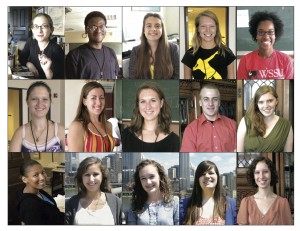
Since March, PHLF has involved 15 students (high school, college, and graduates) in its educational programs and preservation activities. As volunteers with PHLF, each student decides how many hours a week and what days h e/she is able to help out. Once here, interns assist with school tours, workshops for teachers, research and archival assignments, and main street programs. And, if they enjoy being with students, they help out with CampDEC, a 2 0-day adventure with middle school students in the Pittsburgh Public School’s Summer Dreamers Academy. Thank you everyone for your help and effort!
As a result of their experiences, interns add to their portfolios and gain a new (or deeper) appreciation for Pittsburgh’s architecture and history and for the economic, social, and cultural benefits of historic preservation. Intern comments on the value of their experiences include the following:
- Julie Edwards: “PHLF has given me a deeper understanding of Pittsburgh’s extensive architectural heritage and a greater appreciation for the built environment.”
- Alyssa Malobicky: “Thank you for welcoming me back to PHLF again. The hands-on involvement in the day-to-day activities of PHLF teaches me so much. I appreciate all that PHLF does to keep Pittsburgh a special place.”
- Ashley Moore: “Through interning with PHLF, I have a new-found appreciation for Pittsburgh. It is amazing how evidence of the city’s changes was here long before I was and may be here long after I am gone.”
- Barrett Reiter: “My experiences with the educational, non-profit portion of PHLF have taught me that educating future generations is as important as preserving the accomplishments of those past. Without understanding and a personal connection to the built environment our unique history is too easily lost.”
- Shane Martin: “My time with PHLF has broadened my horizons on subjects ranging from historic preservation to urban design and the strenuous human effort put into the systems that hold our society together. I was fortunate to work alongside the very minds that ensure our city’s rich history and put forth my own efforts at planning the future.”
We thank the following 15 people (all pictured above) who volunteered their time and talent to PHLF:
- Lauren Borrelli, Penn State University (Architecture)
- Emily Bush, Miami University of Ohio (History/Journalism)
- Julie Edwards, Kent State University graduate (Interior Design)
- Michal Gould, University of Pittsburgh
- Stacy Litwinowicz, West Virginia University (Interior Design)
- Samantha Mabe, Clemson University (Architecture)
- Alyssa Malobicky, Virginia Tech (Landscape Architecture)
- Shane Martin, University of Pittsburgh (Urban Studies/Architectural Studies)
- Grace Meloy, University of Pittsburgh (Architectural Studies/Civil Engineering)
10. Ashley Moore, University of North Carolina graduate (Masters of Urban Design)
11. Barrett Reiter, University of Pittsburgh ( History/Political Science/Historic Preservation)
12. Katherine Schmotzer, Baldwin High School
13. Emily VanBuren, Slippery Rock University––Masters (History)
14. Camden Yandel, Saint Vincent College (Graphic Design)
15. Sydney Zalewski, Carnegie Mellon University (Architecture/Photography)
To learn more about PHLF’s volunteer internship program click here.
-
Challenge Grant Generates $100,000 for Historic Religious Properties Program
PHLF News
Wednesday, August 04, 2010Thanks to $25,000 in challenge grants from two anonymous donors, The Pittsburgh History and Landmarks Foundation is reviving its recently troubled Historic Religious Properties Program, which provides matching grants to help congregations perform exterior maintenance on their facilities.
“Since 1997, we’ve been giving an average of 70 to 80 thousand dollars a year in grants. When we hit economic hard times in 2010, we suspended the grant program, because there just wasn’t enough money,” says Carole Malakoff, coordinator for the religious properties program.
With the grant program in limbo, two donors stepped up three weeks ago, giving the foundation 60 days to match the grants. The foundation’s President put up $12,500, and over 288 donors contributed gifts totaling $62,710, bringing the total grant package available for the 2011 grant cycle to over $100,210, making this the most successful annual appeal in the Pittsburgh History and Landmark Foundation’s 46 year history.
Applications for grants will be due by December 1, 2010, and provide matching grants up to $10,000 to Allegheny County churches that are over 50 years old.
“Over the years, the majority of our grants have gone to stained glass window work, roof and gutter repair, and masonry work,” says Malakoff.
As a result of the generous outpouring of support, PHLF has decided to host a technical assistance workshop on September 20 at the Calvary Episcopal Church in Shadyside. Experts will provide demonstrations to members of congregations on green building, handicap accessibility, and all that it entails to maintain a historic building.
“We sent out a letter in June to see if there was enough interest, and we’ve had 30 congregations call to say they are interested. So, we’ve had a wonderful response, and we’re still accepting people to come,” says Malakoff.
The workshops go from 10:30 a.m. to two p.m. Interested parties can contact Carole Malakoff at 412-321-3612.
Sign up to receive Pop City each week.
Source: Carole Malakoff, coordinator for PHLF Religious Properties Program
Writer: John Farley -
Historic Religious Properties Technical Assistance Workshop
August 1, 2010
PHLF NewsThanks to a successful Challenge Grant Initiative, the Pittsburgh History & Landmarks Foundation will be offering its Historic Religious Properties Grant Program again this Fall 2010.
We are offering a technical assistance workshop for congregation leaders, representatives, and guardians of historic religious structures on September 20 at Calvary Episcopal Church in Shadyside.
What Will the One-Day Workshop Be About?
You and others from your congregation will be able to attend seminars and speak with experts in the fields of historic preservation, building project planning and financing, and building construction and maintenance.
Seminar topics will include the following :
- Preserving historic religious properties;
- Prioritizing building needs and projects;
- Planning and organizing building projects;
- Financing a project and identifying grant and loan sources;
- Identifying and working with contractors, obtaining bids and estimates, and contracting the work;
- Repairing, restoring, and maintaining stained glass windows, masonry, roofs and gutters, domes, steeples, and steps; and
- Making your historic religious properties more energy efficient.
All of the topics that will be discussed will help you in planning and preparing your next PHLF Grant Application.
Historic Religious Properties Technical Assistance Workshop
- Date: September 20, 2010
- Time: 8:30 a.m. to 2:00 p.m.
- Location: Calvary Episcopal Church, 315 Shady Avenue, Pittsburgh, PA
- Fee: $50.00, payable to PHLF.
Fee covers up to 3 attendees from your congregation, including box lunches.
(Please mail your check by September 15 to Carole Malakoff, PHLF, 100 W. Station Square Drive, Suite 450, Pittsburgh, PA 15219)For reservations contact: hrp@phlf.org or Carole Malakoff: 412-471-5808 or 412-321-3612.
Attendance is limited.

